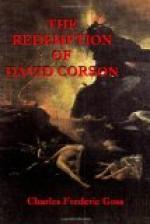But it was not so much the objects themselves as the spirit pervading them, which stirred the depths of the child’s mind. The little pantheist saw God everywhere. We bestow the gift of language upon a child, but the feelings which that language serves only to interpret and express exist and glow within him even if he be dumb. And this gift of language is often of questionable value, and had been so with him. Things he had heard said about God often made the boy hate Him. All that he felt, filled him with love. To him the valley was heaven, and through it invisibly but unmistakably God walked, morning, noon and evening.
To the child sauntering dreamily and wistfully along, the object dimly seen from the farm-house door began gradually to dissolve itself into a group of living beings. Two horses were attached to a plow; one standing in the lush grass of the meadow, and the other in a deep furrow traced across its surface. The first, an old gray mare, was breathing heavily, her sides expanding and contracting like a bellows. Her wide nostrils opened and closed with spasmodic motions. Her eyes were shut and she seemed to be asleep. The other, a young and slender filly doing this season the first real service of her life, pawed the ground restlessly, snorted, shook her mane, rattled the harness chains and looked angrily over her shoulder at the driver. The plowshare was buried deep in the rich, alluvial soil, and a ribbon of earth rolled from its blade like a petrified sea billow, crested with a cluster of daisies white as the foam of a wave.
Between the handles of the plow and leaning on the crossbar, his back to the horses, stood a young Quaker. His broad-brimmed hat, set carelessly on the back of his head, disclosed a wide, high forehead; his flannel shirt, open at the throat, exposed a strong, columnar neck, and a deep, broad chest; his sunburned and muscular arms were folded across his breast; figure and posture revealed the perfect concord of body and soul with the beauty of the world; his great blue eyes were fixed upon the notch in the hills where the sun had just disappeared; he gazed without seeing and felt without thinking.
The boy approached this statuesque figure with a stealthy tread, and plucking a long spear of grass tickled the bronzed neck. The hand of the plowman moved automatically upward as if to brush away a fly, and at this unconscious action the child, seized by a convulsion of laughter and fearing lest it explode, stuffed his fists into his mouth. In the opinion of this irreverent young skeptic his Uncle Dave was in a “tantrum” instead of a “trance,” and he thought such a disease demanded heroic treatment.




